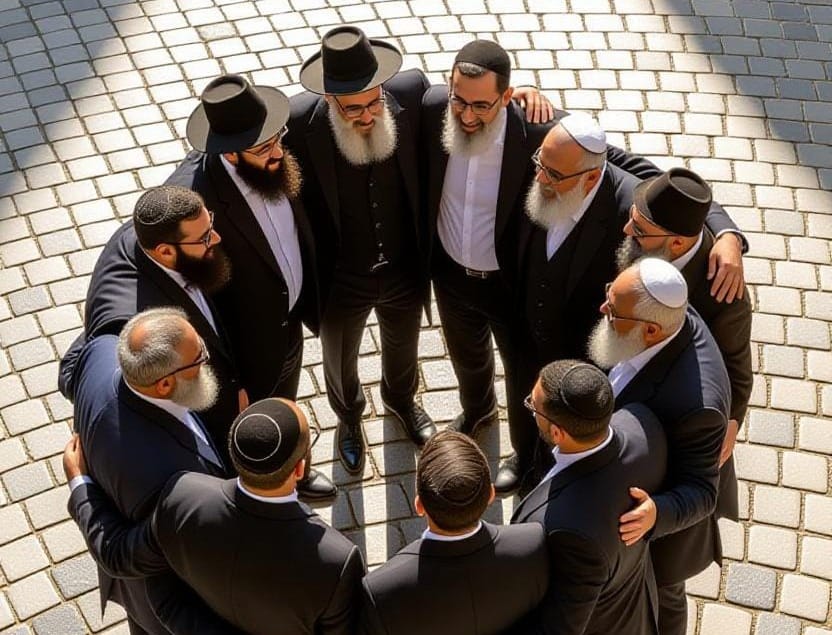Does Unity Mean We Must Compromise on Truth?

And Are We Obligated to Love Even Those Who Are Secular or Not in Line with Our Mesorah?
Ahavas Yisrael—love for a fellow Jew—is not a slogan. It is a mitzvah. A foundational one. But it is also a mitzvah with depth, clarity, and boundaries.
So the answer is nuanced: Yes, we are obligated to love every Jew, even those who are distant from Torah. But no, unity never means compromising on Torah truth. When love is misapplied, it can lead to real halachic dangers.
1. We Are One People — Even When We're Not the Same
The Torah states:
“בנים אתם לה׳ אלוקיכם” “You are children to Hashem your G-d.” (Devarim 14:1)¹
This status never changes. Even a Jew who sins, even one who fights Torah, remains our brother. The Rambam teaches that a Jew who strays is still considered part of Klal Yisrael². Rav Chaim Shmuelevitz zt”l famously said:
“Ahavah for a Jew is not because he agrees with you. It’s because he is you. We are all limbs of one body.”³
But like in a human body, if one limb becomes infected, we treat it carefully — not by letting the infection spread, but by addressing it with truth and healing.
2. Loving the Wrong Way Can Lead to Compromising Halachah
The danger in some calls for “achdus” today is that they blur lines that Chazal and the Shulchan Aruch set clearly.
Examples:
- Joining in prayer services led by those who reject Torah sheba’al peh or deny ikarei emunah — even if “for unity” — is halachically forbidden⁴.
- Inviting public Sabbath violators to lead religious events, speak at Torah institutions, or receive aliyos may violate both hilchos kavod haTorah and maris ayin⁵.
- Co-signing joint “rabbinic” declarations with movements that endorse toeivah, mixed prayer services, or reject basic halachic observance gives legitimacy to rebellion against Torah⁶.
Ahavah cannot become justification for aveirah. We love every Jew. But we do not affirm every choice.
3. Love Must Walk with Truth
Chazal declared:
“ואהבת לרעך כמוך — רבי עקיבא אומר: זה כלל גדול בתורה.” “Love your fellow as yourself — this is a great principle of Torah.” (Sifra, Kedoshim)⁷
Yet Rav Yaakov Emden zt”l wrote:
“Ahavah without Emes becomes betrayal. If you truly love a fellow Jew, you will never tell him that falsehood is truth.”⁸
Unity without Torah is like a bridge without pillars — it collapses under pressure.
4. How Do We Relate to Jews Who Fight Torah?
With love. With ache. With honesty.
Rav Elchonon Wasserman zt”l wrote that the greatest act of compassion for a secular Jew is to help him see truth — not to clap while he walks away from it⁹.
Rav Aharon Leib Shteinman zt”l cried for secular Jews, davened for their teshuvah — but never allowed dilution of Torah standards to “accommodate” them¹⁰.
Rav Moshe Feinstein zt”l warned strongly: We must never treat Torah prohibitions lightly in the name of peace or inclusion. Doing so destroys both peace and Torah¹¹.
5. “But Aren’t They Also Doing Good?”
Perhaps. And we acknowledge every good act.
But Judaism is not cafeteria-style. It is one unified system of emunah, halachah, and mesorah. We don’t judge hearts — that’s for Hashem — but we must judge ideologies. The Torah says:
“ולא תתורו אחרי לבבכם ואחרי עיניכם.” “Do not stray after your hearts and eyes.” (Bamidbar 15:39)¹²
Calling treif "kosher," or rebellion "another path," is not love — it’s misleading a fellow Jew.
6. So What Does Chareidi Unity Look Like?
It means:
- We love every Jew, regardless of where they are.
- We cry for those who are distant.
- We show kindness, welcome, and humility.
But we do not:
- Apologize for Torah values.
- Sanction sin in the name of harmony.
- Join in institutions that oppose the foundations of Yahadus.
As Rav Shimon Schwab zt”l wrote:
“Ahavah without boundaries becomes weakness. Unity without truth becomes heresy.”¹³
7. Every Jew Is a Brother — But Truth Is Our Father
The Steipler Gaon zt”l once said:
“A Jew who mocks Torah is like a child in pain who hits his own father. We don’t hate him — we try to heal him. But we don’t put the stick in his hand.”¹⁴
We must have hearts big enough to love and strong enough to stand for truth.
Conclusion
Yes, we yearn for unity. We ache for it. But not the unity of blurred lines, of compromised halachah, or of movements that rewrite the Torah.
We want the unity of Klal Yisrael standing shoulder to shoulder — with Yiras Shamayim, with Torah, and with Emes.
Until then, we love all Jews — and we pray they return to the eternal truth that binds us.
Footnotes & Sources
- Devarim 14:1 – “You are children to Hashem…”
- Rambam, Hilchos Teshuvah 3:14 – “Even if a Jew sins, he remains a Jew.”
- Rav Chaim Shmuelevitz, Sichos Mussar, Maamar 34
- Igros Moshe OC 1:33 – forbidding participation in non-Orthodox services
- Shulchan Aruch OC 128:38 and Magen Avraham there
- Rav Yosef Shalom Elyashiv, Teshuvos regarding partnerships with reform movements
- Sifra on Kedoshim; Rashi on Vayikra 19:18
- Rav Yaakov Emden, Siddur Beis Yaakov, Ahavah Rabba commentary
- Rav Elchonon Wasserman, Kovetz Maamarim
- Rav Aharon Leib Shteinman, Orchos Yosher – Ahavas Yisrael
- Igros Moshe YD 4:38 – on preserving halachic standards despite modern trends
- Bamidbar 15:39 – “Do not stray after your hearts and eyes”
